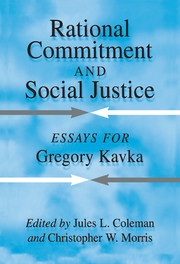Book contents
- Frontmatter
- Contents
- Acknowledgments
- List of Contributors
- Introduction: The Moral and Political Philosophy of Gregory Kavka
- Some Personal Memories
- The Shadow of the Future
- A New Paradox of Deterrence
- Rethinking the Toxin Puzzle
- Toxin, Temptation, and the Stability of Intention
- The Toxin Puzzle
- Religion and Morality in Hobbes
- Contemporary Uses of Hobbes's Political Philosophy
- The Knavish Humean
- Some Considerations in Favor of Contractualism
- Justice, Reasons, and Moral Standing
- Wrongful Life: Paradoxes in the Morality of Causing People to Exist
- Gregory S. Kavka's Writings
Some Considerations in Favor of Contractualism
Published online by Cambridge University Press: 28 October 2009
- Frontmatter
- Contents
- Acknowledgments
- List of Contributors
- Introduction: The Moral and Political Philosophy of Gregory Kavka
- Some Personal Memories
- The Shadow of the Future
- A New Paradox of Deterrence
- Rethinking the Toxin Puzzle
- Toxin, Temptation, and the Stability of Intention
- The Toxin Puzzle
- Religion and Morality in Hobbes
- Contemporary Uses of Hobbes's Political Philosophy
- The Knavish Humean
- Some Considerations in Favor of Contractualism
- Justice, Reasons, and Moral Standing
- Wrongful Life: Paradoxes in the Morality of Causing People to Exist
- Gregory S. Kavka's Writings
Summary
The rights and responsibilities that we recognize in our critical moral practices serve human interests in deep and pervasive ways; that is part of their point. At the same time, they do this by constraining our pursuit of those interests; that is how they work. These utterly familiar features of our practices turn out to be troublesome for moral philosophy; they have seemed in serious tension with one another. One of the chief appeals of contractualist moral theory is its capacity to accommodate these features in a straightforward manner. In this essay, I want to articulate this theoretical virtue more fully.
The connection between morality and general human well-being gives some credibility to the long-standing notion that morality is in some sense an expression of love or benevolence. This notion belongs, of course, to one strand of Christian teaching, but utilitarians have traded on this truth as well, especially when seeking to put their doctrine in a high-minded light. “In the golden rule of Jesus of Nazareth,” John Stuart Mill assures us, “we read the complete spirit of the ethics of utility. ‘To do as you would be done by,’ and ‘to love your neighbor as yourself,’ constitute the ideal perfection of utilitarian morality.” More recently, J. J. C. Smart put utilitarianism forward as the unique theoretical expression of “generalized benevolence,” the outlook of those who have the “welfare of humanity at heart.”
- Type
- Chapter
- Information
- Rational Commitment and Social JusticeEssays for Gregory Kavka, pp. 168 - 185Publisher: Cambridge University PressPrint publication year: 1998
- 4
- Cited by



